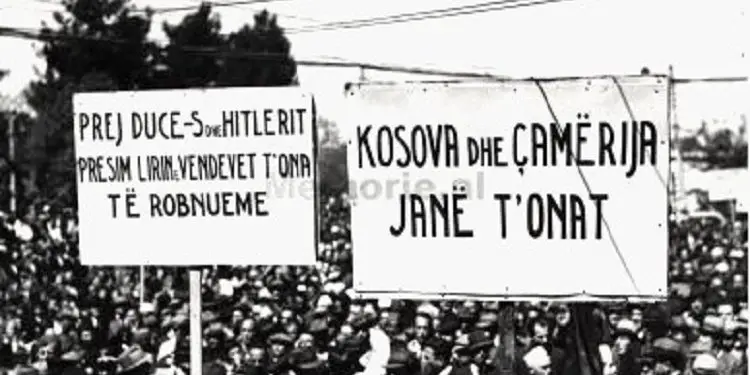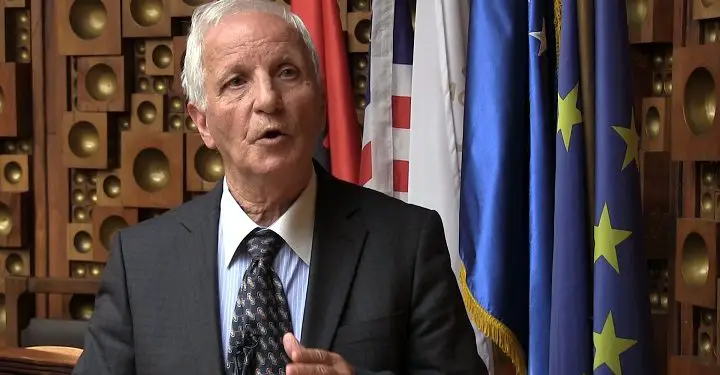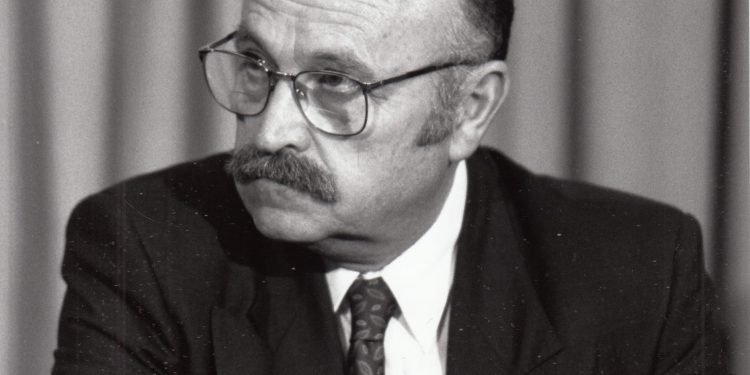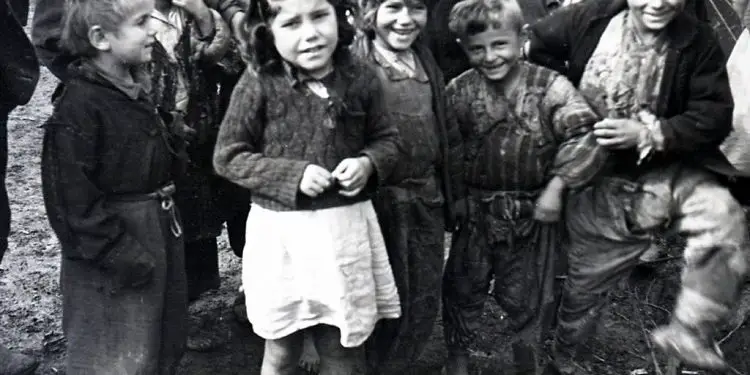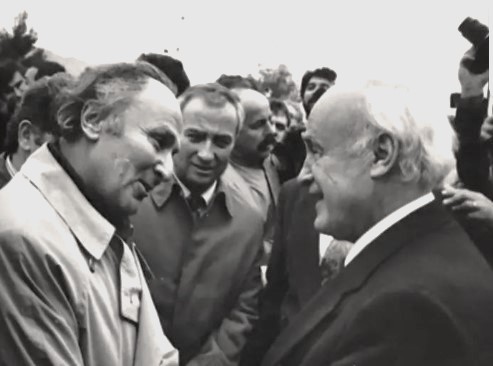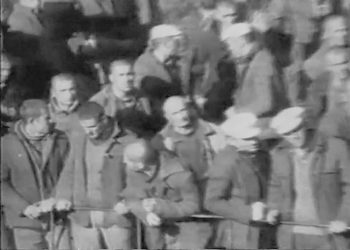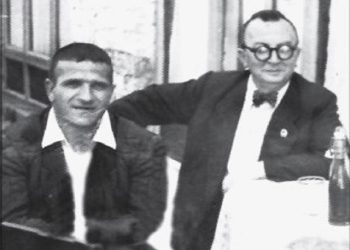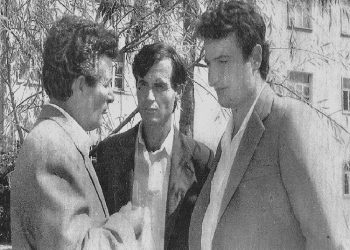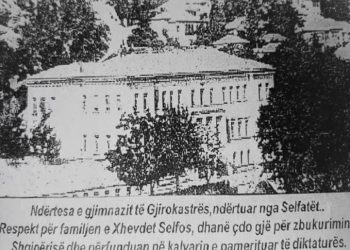Memorie.al / Immediately after the formation of the democratic government, Prime Minister Konstantinos Mitsotakis, who was also temporarily serving as the Foreign Minister, suddenly announced in the Greek Parliament that he would make an official visit to the Republic of Albania. Naturally, this would be a familiarization visit with the new leadership team in the neighboring country and the delivery of his messages to the new democratic government. This was especially important as the crisis in Yugoslavia, official Greek support for Serbia, and the conflict surrounding Macedonia as a newly formed state had significantly compromised Greece in the eyes of the free world. Even the attempt to justify his trip to Pale, along with Milošević, at that center of Serbian crime, as a response to the request of the English Conservative negotiator Owen, was not finding much understanding.
In Mitsotakis’ perception, the coming to power of the democratic government in Albania marked a kind of personal success because, as we have seen, he had been among the most vocal opponents of the Albanian communist regime, but primarily because of the Greek minority and his own hidden political aims in that regard. On the other hand, his victory in the last elections was simultaneously a kind of punishment for the PASOK party’s policy of silence over its two governing mandates at UN forums regarding the “suffering of the Greek minority living in Albania.”
In addition, during the early phase of the Democratic Party’s activity, he had reached out to establish special ties with this party, driven by the common anti-communist cause. Therefore, according to him, he was coming to Tirana with a “double merit,” a fact he highlighted in his very first words when addressing the newly appointed Prime Minister, Aleksandër Meksi.
“I come as a friend,” he said, “we are ready to help you in all directions, because today you are a democratic country, this is recognized by everyone, and, first and foremost, we, the Greeks, recognize it! But we are also here to gain support so that, from now on, we have a platform for meetings and suggestions at all ranks, on all topics, especially those concerning Greek foreign policy.”
His presentations during the talks, which sounded like a carefully prepared and ambitious platform, were extensive and comprehensive. They left almost no field of political and economic activity untouched. This time, he not only repeated the promises made during the first visit but also added many other points which, if one were to believe them, would lead to the speedy resolution of the endless problems left to us as a dowry by history and the dictatorship.
His new promises were as follows:
-He would give the order to halt the “skupa” (broom) operation against Albanian immigrants (thereby indirectly presenting himself, as was rumored publicly, as its author!);
-He would sign employment agreements for Albanian immigrants (long-term and seasonal);
-He would settle the refugees temporarily staying in Greece;
-The customs agreement would be signed, and two new border crossing points would open;
-The granting of visas for traders would be eased;
-He would commit to initiating discussions regarding the properties of Albanians in Greece;
-Aid to Albania would continue on a new basis (according to the requests and needs of the Albanian side, indirectly acknowledging the errors found in the distribution of aid, which had only benefited Greek minorities);
-He would encourage Greek investments in the economy, tourism, and maritime transport;
-He would encourage the opening of Greek banks, and an agreement for the avoidance of double taxation would be signed;
-He invited 250 people for specialization in Greece, in the field of organizing employment abroad;
-He expressed readiness to start negotiations for the continental shelf between the two countries (to be signed in Athens by the Prime Minister or Foreign Minister) and to establish close relations between the television stations of the two countries “to help create a correct image between the two countries.”
Regarding political relations:
-He expressed readiness for a friendship and cooperation agreement and for the institutionalization of consultations between the two Foreign Ministries every month or every two months, in addition to those between the Foreign Ministers, Prime Ministers, and Presidents of the two countries;
-He pledged to support Albania in the G-24 Group of the European Community for Albania’s economic needs, and informed that, together with Italy, they had agreed to support Albania’s membership in the NATO Foreign Ministers Council;
-He refused the lifting of the visa system to increase contacts between the two peoples, as proposed by the Albanian side, and insisted that, regarding immigration, Albania should deal with the control of the borders;
-He presented the issue of consulates as a need for visas but did not condition their opening;
-For the moment, he agreed to open only one consulate each and two new border points;
-He expressed positively on the issue of the 23.4-million-dollar loan, while the issue of the repayment period and the reduction of its interest was left to be discussed again, as it was not within the Prime Minister’s competence.
After this mirage that Mr. Mitsotakis unveiled, with visible ease and pride, he received the following verbal assurances from the very needy Albanian government:
-The Albanian side is ready to cooperate with Greece, as two neighboring countries;
-The Greek minority in Albania will enjoy all the rights foreseen in international documents, including the right to religion and education;
-Albania understands the role of Greece for its quick entry into the European Community and is grateful for this;
-It seeks the establishment of relations on new bases and an increase in political, economic, and human contacts between the two countries;
-It was also assured that the Albanian government will strive to control the emigration of people to Greece and to guard the border on the Albanian side, to prevent illegal immigration;
-It welcomed the suggestion for regular contacts between the personalities of the two countries, and, in general, the intensification of relations in all fields with mutual benefit.
However, at the press conference, Prime Minister Mitsotakis revealed two other details of these talks, which he otherwise considered constructive:
a) The Albanian government had promised him that it would not recognize Macedonia before the European Community did so, and
b) The opening of the Greek Consulate in Gjirokastër and the Albanian Consulate in Ioannina.
DISAGREEMENTS
Speaking in the interview about the general evaluation of the meeting, Mitsotakis stated that he had agreed with the Albanian side on 90% of the issues discussed, but that two issues remained a cause of divergences, as always: the Cham issue and the Kosovo issue.
It was also made known that the Albanian Prime Minister, Mr. Aleksandër Meksi, had told his Greek counterpart:
“We seek the realization of the Chams’ rights, in accordance with the rights recognized by international norms. This is not about border changes, but we want their return to their hearths, to also have rights over their homes and properties. This is a concern for us because it was a problem closed by the communist regime, just like other problems related to human rights. Today, as a democratic government, we have accepted that property is sacred, and these residents who lived in Northern Greece today ask the Albanian government to be an interpreter of this request, and we feel it as a national problem that can be solved, with good will, for good relations between the two peoples, who are good neighbors, who have been involved in each other’s national liberation history. This problem cannot be ignored by the Albanian government, which believes it will find a solution in time!”
Mitsotakis, who perhaps did not think (or at least pretended not to) that this would be one of the first important issues of the talks, emphasized that he would leave no doubt on this topic, and he did so. He said:
“The topic is known to us and to you. The Chams who came from Greece were war criminals; they created problems. Decades have passed, and Greece will not agree to their return. I want to emphasize this! The issue of properties is something else, which can be discussed. Are there citizens of Greek origin who have left properties in Albania? At some point, we can discuss with both sides. Return, no. If they return, they will bring hatred. Time has made the problem forgotten. It is not in your interest and ours to discuss this issue. This is our position, and within the friendly climate, I clarified this position to you.”
Mr. Meksi, disappointed by this icy response, gave the supplementary explanation:
“The Chams considered themselves refugees in Albania, and not all of them were collaborators, such as the women and children. For bad memories, there can be no return; such things have also happened in Albania. And the democratic forces have pursued a policy of national reconciliation, not score-settling. I am convinced that, in the context of good relations between the two governments, a solution will be found. We are under pressure for this problem to find a solution, based on international norms.”
In conclusion, with the intervention of Mr. Alfred Serreqi, it was clarified that the Cham problem was not reduced only to the issue of properties, just as it was not a persistent request of the Albanian government that all Chams should return. But the important element that the Greek side should not neglect was, for now, that they should be treated like everyone else, i.e., to circulate freely, as equals with others.
Mr. Mëhill Marku meets Ms. Virginia Tsouderou
On the same day, Mr. Mëhill Marku met with his Greek counterpart, Ms. Virginia Tsouderou, who, in a somewhat arrogant manner, requested that their discussions be as concrete, direct, and transparent as possible.
The Albanian Deputy Minister seemed to have been eagerly awaiting this suggestion from her. “We are also of the opinion to speak openly and sincerely about the problems we have between us, but which are inherited,” he said.
And immediately after this, he spoke in order: about the Cham issue, the border problem, the “Vorio-Epirote” societies, which had been greatly revived in their anti-Albanian propaganda, about the “broom” operation of the past year in Omonia Square, about the conditional Greek aid, about the misinformation regarding the Greek minority in Albania, about Greece-Serbia relations and the frequent exchange of visits with Milošević, and finally, he asked her to annul the act that had placed a conservative sequestration on the properties of Albanians in Greece.
He went so far as to, slightly disregarding diplomatic tact towards her, quote her own anti-Albanian statements, uttered two or three years earlier when she was in opposition. “You have canceled your economic delegation’s visit twice, under the pretext that our side did not accept your request to open three consulates in Korçë, Gjirokastër, and Sarandë,” he told her, revealing, in a way, her two-faced presentation.
Nervous, Ms. V. Tsouderou chose to counter-respond with the same measure, with short, sharp, and dismissive sentences.
She told him:
“You must abandon the idea of expansion (implying Kosovo and Western Macedonia). Your propaganda does not reflect reality. Without knowing the reality, it rushes and gives everything to the press. We demand the treatment of the Greek minority according to international conventions. We know there are minorities even in Shkodër, so we want schools for isolated minorities as well, while the ‘broom’ operation is directed against those who have arrived illegally, who commit criminal acts, and worry the Greek people.”
When Mr. Marku brought up the Cham problem again, she retorted almost out of control:
“Regarding the Cham problem, it was discussed extensively between the two Prime Ministers this morning. It was made clear that there is no basis or right for the Chams to come to Greece. They were part of a minority that sided with Greece’s opponents. They supported the Nazis. They are classified as criminals; therefore, they cannot return. They lost their properties. We do not want and will not allow them to return to Greece. If there is any property that can be discussed, let us do it gradually. The arrival of the Chams would mean an uprising in Greece!”
The meeting was short, and no attempt was noticed to soften the open contradictions with any formal phrasing or in accordance with the relatively soft and reasoned tone of their respective chiefs.
A few days after this highly charged meeting, Mr. Mëhill Marku was removed from the Ministry (for reasons that are unknown) and began his new private life, far from the homeland. Memorie.al




